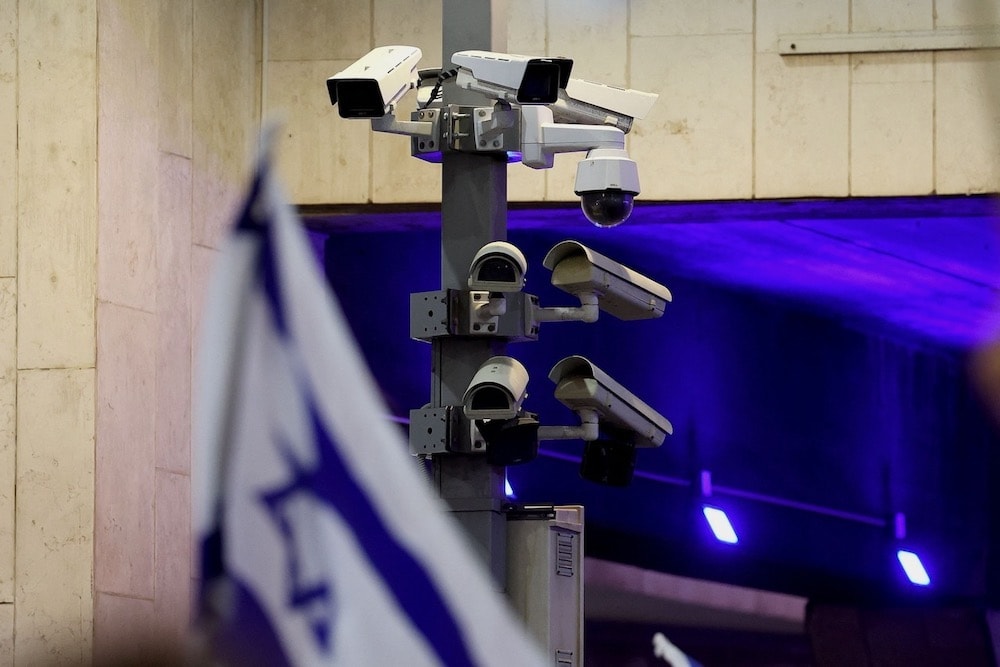A look at how Israel exploits the occupation to test new surveillance technologies sold on global markets.
Ed. Note: At the time of publishing this piece, we at IFEX are bearing witness to the atrocious escalation of violence in Palestine and Israel. In this worrisome context, we express our firm solidarity with IFEX members MADA, 7amleh and I’Iam, and with our colleagues throughout the region, as the consequences of the conflict spread beyond their borders.
This statement was originally published on 7amleh.org on 19 December 2023.
The Arab Center for the Development of Social Media published a report on “Israel’s Surveillance Industry and Human Rights: Impact on Palestinians and Worldwide”. The report provides an overview on the reality of the Israeli surveillance systems industry, and outlines its impact on the human rights of Palestinians and implications worldwide. The report relies on scholarly writing and policy briefs, as well as previously published research on Palestinians living under intensive state surveillance, which has increased significantly in the region following Israel’s war on Gaza, ongoing since October 7, 2023.
The report emphasizes that the development of surveillance technologies and their unchecked proliferation in the occupied Palestinian territory has a repressive impact on the lives of civilians living under military occupation and exacerbates violence to the detriment of human rights in Palestine. Additionally, the development of these surveillance technologies has human rights implications worldwide. The report also discussed how private Israeli companies omit the constraints of digital and AI-powered surveillance systems in order to market and promote these systems abroad, taking advantage of the increased fear, insecurity and repression they enable in the occupied Palestinian territory. Israeli companies also market their spyware, social media monitoring technologies, and biometric surveillance technologies as generic solutions to international insecurity, the effectiveness of which has been tried and tested at the detriment of Palestinians’ human rights.
The report highlighted the recent history of the Israeli surveillance industry and its effects on Palestinians in five sections that contextualize the growth of the industry within global trends in securitization and surveillance during the 21st century. It assessed the impact of spyware technologies, social media monitoring tools, and biometric surveillance methods. It explained the horrific impact of total surveillance on Palestinians in Israel and the Occupied Palestinian territories, and on citizens worldwide as the implications are not limited to Palestine only, as these surveillance systems have become part of a profitable international trade.
The report also presented a set of recommendations to mitigate the harmful impacts of these systems, and among these recommendations that 7amleh Center concluded in its report“Israel’s Surveillance Industry and Human Rights: Impact on Palestinians and Worldwide,” are the following: a necessity to take immediate steps to stop the harm of new surveillance technologies on Palestinians, ending mass surveillance of innocent civilians, and ending the draconian policing of Palestinian digital spaces. The report stresses the importance of the international community taking concrete steps to reign in the development and deployment of new invasive technologies by private firms, to enact comprehensive and rights-based regulatory frameworks, as well as accountability mechanisms for the use, development and production of automated surveillance technologies.
The report’s recommendations also point to the need to hold bad actors accountable and identify and ban companies causing harm. In addition, the report calls for a comprehensive global framework to regulate the sale and transfer of these systems, focusing on the industry in general rather than specific companies. The text indicates that banning some technologies may be necessary, based on international agreements that prohibit certain weapons, and the text emphasizes that these measures could serve as a model for other countries in restricting the activity of companies that are capitalizing on the occupation.
To view the full report on Israel’s Surveillance Industry and Human Rights, you can click here.



